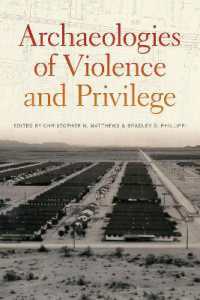Full Description
Cooper's The Chainbearer presents an exciting narrative that interrogates issues of what it means to own land. The novel examines the claims of ownership of wilderness land among Native Americans, New England squatters, and the old New York families with legal deeds.
In 1845 and 1846, James Fenimore Cooper published The Littlepage Manuscripts, a trilogy reflecting on the anti-rent movement among small farmers leasing parcels in the Hudson Valley who had begun protesting against the land ownership of the old Dutch patroons. Tracing four generations of the landowners, the trilogy focused on fundamental issues of what land ownership meant under the US Constitution-which Cooper understood to guarantee absolute rights of property ownership-and also the legitimacy of such ownership of land taken from the Native Americans who did not hold such doctrines.
Cooper told his British publisher that the guiding theme of The Chainbearer (1845), the second novel in the series, was "Revolution," which he presented by beginning the novel with recounting the heroic participation of his hero, Mordaunt Littlepage, in the American Revolution. In 1784, to manage his family's holdings, Mordaunt ventures into the wilds of upper New York, where settlers, many from New England, hoped the Revolution had dissolved their "feudal" commitments to the legal owners. There he encounters one of Cooper's archetypal demagogues, Jason Newcome, who manipulates the settlers to his advantage, as well as an old family friend, Susquesus, the "upright Onondago," who challenges Mordaunt to justify what it means to claim private ownership of land his people held in common. The plot culminates with characteristic flee-and-capture excitement when a lawless squatter, Aaron "Thousandacres," imprisons the hero, who is ultimately freed through the agency of his faithful Dutch surveyor, Andries Coejemans, the "Chainbearer," and his beautiful niece Ursula, whom Mordant ultimately marries-despite her lower-class heritage.
The editors have prepared this scholarly edition from the extant manuscript at the American Antiquarian Society. They provide detailed accounts of the genesis of the novel and of their editorial procedures. This edition also contains explanatory notes for the historical references, as well as an essay on the history of the anti-rent movement by John P. McWilliams.
The Writings of James Fenimore Cooper
The distinguished Cooper scholar James Franklin Beard (1919-1989) began organizing the Writings of James Fenimore Cooper in the late 1960s, as his work on publishing the monumental Letters and Journals of James Fenimore Cooper came to fulfillment. Beard's intention was to provide readers with sound scholarly editions of Cooper's major works, based wherever possible on authorial manuscripts. To date, the Writings of James Fenimore Cooper has made available texts of many of Cooper's best-known novels, as well as some of his most important works of political and social commentary.
Contents
Acknowledgments
Historical Introduction
Illustrations
The Chainbearer
Explanatory Notes
Textual Commentary
Note on the Manuscript
Emendations
Rejected Readings
Textual Notes
Word-Division








